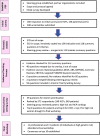Identifying research priorities in breast cancer surgery: a UK priority setting partnership with the James Lind Alliance
- PMID: 36319906
- PMCID: PMC9628302
- DOI: 10.1007/s10549-022-06756-4
Identifying research priorities in breast cancer surgery: a UK priority setting partnership with the James Lind Alliance
Abstract
Purpose: A James Lind Alliance priority setting partnership was developed to identify research priorities in breast cancer surgery from individuals with lived experience, at high genetic risk of breast cancer, and healthcare professionals (HCPs).
Methods: 'Uncertainties' were collected using an online survey. Following an evidence check and development of summary questions, an interim survey asked participants to rank their top 10 research priorities from the question list. Top-ranked questions from patient/carer, high-risk and professional groups were carried forward for discussion to a final online prioritisation workshop.
Results: 260 participants (101 patients/carers, 156 HCPs) submitted 940 uncertainties via the initial survey. These were analysed thematically into 128 summary questions in six topic areas. Following evidence checking, 59 questions were included in the interim survey which was completed by 572 respondents. Marked differences were seen in questions prioritised by patients/carers, HCPs and women at high-risk. The top eight priorities in patient/carer and professional groups and top two priorities for high-risk women were carried forward to the online workshop at which 22 participants discussed and agreed the final top 10. Key themes included de-escalation of breast and axillary surgery, factors impacting the development/detection of locoregional recurrence and optimal provision of support for informed treatment decision-making.
Conclusion: The top 10 research priorities in breast cancer surgery have been agreed. However, the observed differences in research priorities identified by patients and professional groups were not anticipated. Top priorities from both groups should inform future UK breast cancer surgical research, to ensure that it addresses questions that are important to breast cancer community as a whole.
Keywords: Breast cancer surgery; Consensus; James Lind Alliance; Research priorities.
© 2022. The Author(s).
Conflict of interest statement
RIC reports institutional research funding from SECA and Astra Zeneca. SMcI reports institutional research funding from Novartis and Sanofi, advisory boards for Roche and Lilly, honoraria from Roche, BD and Daiichi-Sankyo, and conference travel and support from Roche and Lilly. The remaining authors declare they have no relevant financial or non-financial interests.
Figures
References
-
- Cancer Research UK. https://www.cancerresearchuk.org/health-professional/cancer-statistics/s... 2019 [Available from: https://www.cancerresearchuk.org/health-professional/cancer-statistics/s....
-
- Cancer IAfRo. Cancer today: Estimated number of new cases in 2020, worldwide, both sexes, all ages (excl. NMSC) 2022 [Available from: https://gco.iarc.fr/today/online-analysis-table?v=2020&mode=cancer&mode_....
-
- Allemani C, Weir HK, Carreira H, Harewood R, Spika D, Wang XS, et al. Global surveillance of cancer survival 1995–2009: analysis of individual data for 25,676,887 patients from 279 population-based registries in 67 countries (CONCORD-2) Lancet. 2015;385(9972):977–1010. doi: 10.1016/S0140-6736(14)62038-9. - DOI - PMC - PubMed
Publication types
MeSH terms
Grants and funding
LinkOut - more resources
Full Text Sources
Medical



